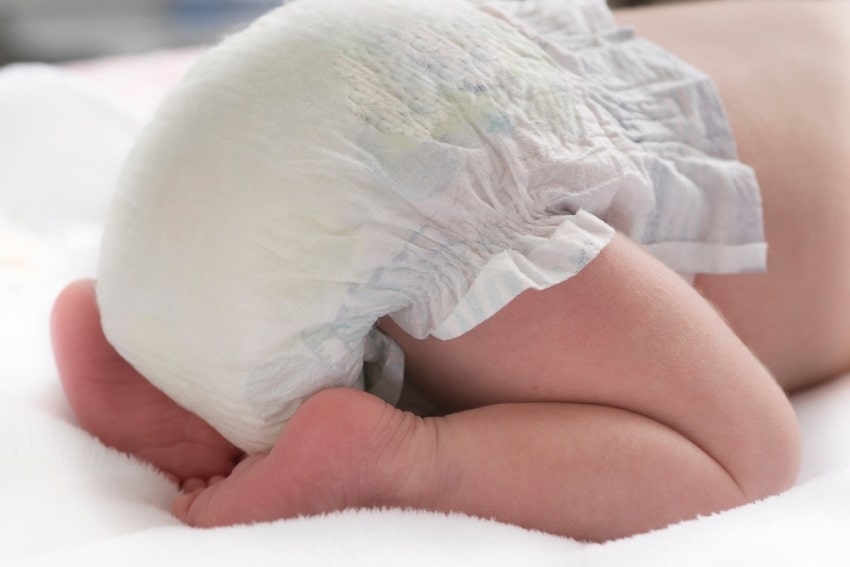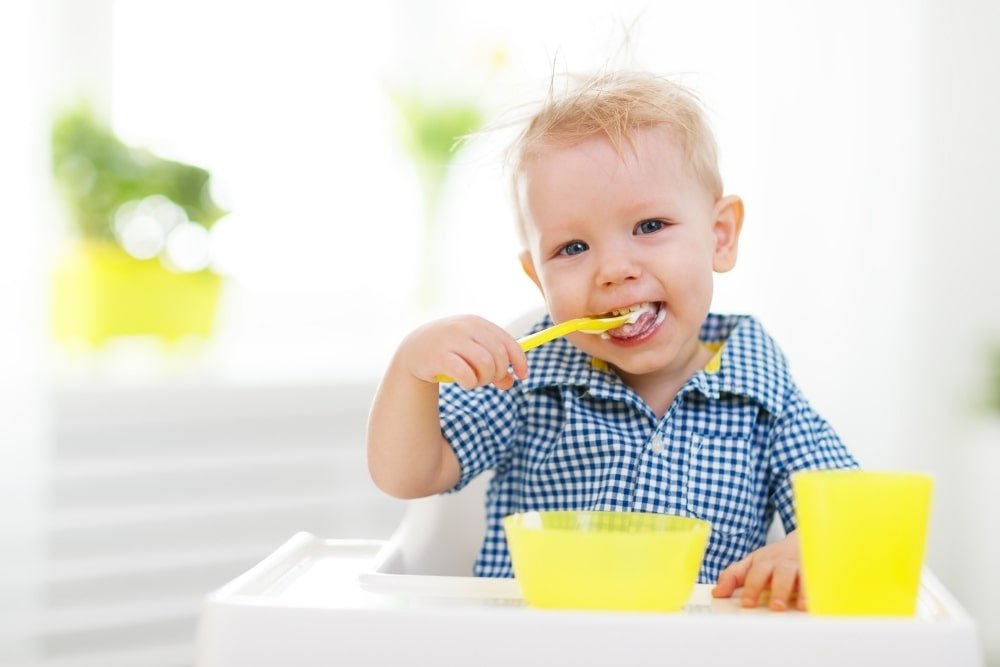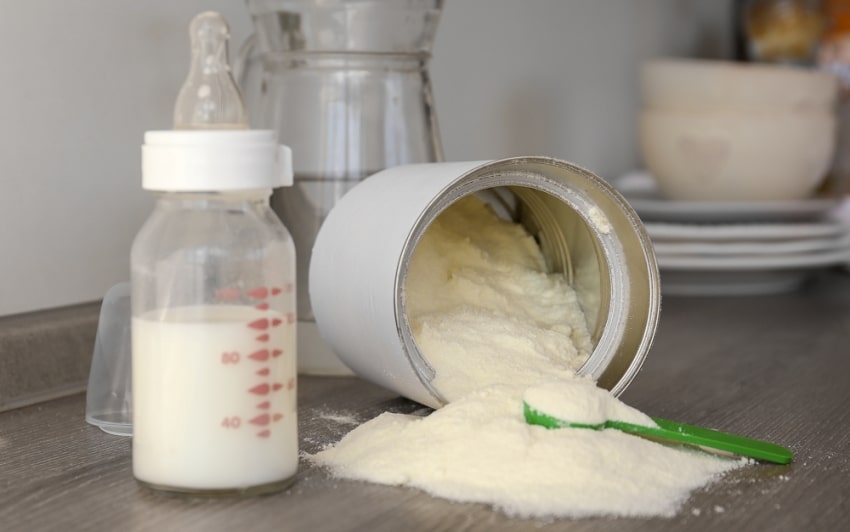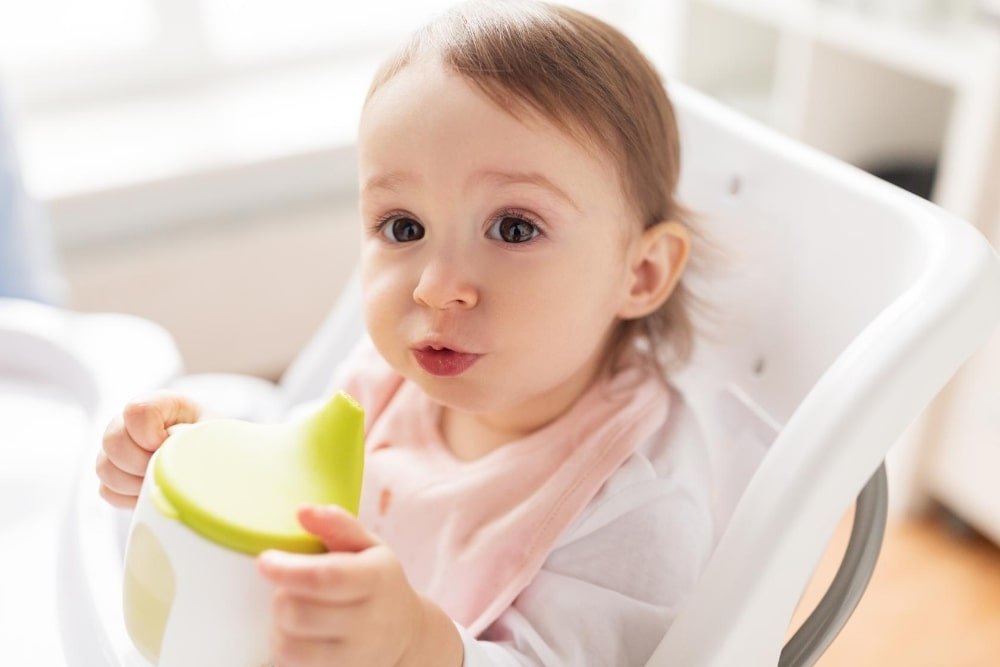One of the worst things for a newborn baby to have is constipation. It can make them cry randomly. At first, you might not know what to look for when it comes to constipation in babies.
But, eventually, when you discover it’s been constipation and not a hungry cry you’ll want to take action to help your baby out.
While there are many ways to combat constipation, sugar water is recommended by many pediatricians over the years. In fact, they even offer sugar water to babies in the emergency room to help soothe them during procedures.
How much of this protocol is actually helpful, and does it help soothe constipation in babies?
How Does A Constipated Baby Behave?
Any issues with feeding can be troubling for parents as well as their babies, it can be a difficult thing to work through.
Some issues are minor in babies under one-year-old, but when the symptoms are repetitive, it can be unsettling to have a baby who behaves the way constipation makes little ones behave.
Spitting up often in small babies is common for constipation
When a baby is constipated it’s likely their tummy’s don’t feel good from it, they might spit up more frequently.
This is due to the bowels not keeping up with production and being slow to digest food. It sits on the stomach longer than normal, giving more time for them to spit it back up.
Straining while pooping or not going at all
If you’ve ever been constipated you know how hard it can be on the bowels to pass a stool. It’s the same way for babies, you might catch your baby straining to pass their poop.
If they’re making grunting noises or crying while going to the restroom you might need to offer a little water while going to the bathroom.
View in gallery
Stools that come out dry or hard
Stools that are hard dry, and don’t come out easily for your baby are a sure sign of constipation. Poop may come out looking like small round balls, too.
If you notice your baby’s poop looks of this texture, then you can assist with moving their digestion in the right direction.
A distended abdomen or bloating is a sure sign of constipation
Some infants naturally are gassier and will have a distended belly, meaning it looks round and feels quite firm, especially very small infants, that don’t move around much.
You can help your baby of any age to relieve this by doing bicycle kicks with them.
Bright red blood on the toilet paper or baby wipe after wiping your baby
If you wipe your baby and notice that there is a bit of blood remaining on the wipe or toilet paper, it suggests that your baby’s bottom is irritated from being constipated.
In addition, your baby might have the blood from attempting to pass stools that are too hard for their body to pass.
Going poop less than three times a week in older babies or toddlers
Babies should be going poop at least 4-12 times a day, and no less than three bowel movements per day. Toddler years and beyond your child should be passing at least 3 bowel movements a week and can pass as many as 3 a day.
Grabbing at their buttocks or clenching their cheeks together
If you notice that your toddler is grabbing at their pants in the back and complaining this could be their way of telling you that they aren’t feeling well.
If your younger baby is clenching their buttock and whining or seeming to not feel well, this is a common thing that kids who are constipated tend to do.
Constipation In Formula-fed Babies vs Breastfed Babies
View in gallery
Babies who drink formula are regularly constipated, this is because the formula is a lot more work for babies to process in their digestive systems.
Breastfed babies usually go to the bathroom after almost every meal, this is what is the most common among breastfed babies. With that said, it is not uncommon for babies to go a week without using the bathroom too.
Just like every adult, each baby is also different from the next person. The cycles and consistency of poop might vary from baby to baby.
In a breastfed baby
Babies who strictly drink breast milk can go to the bathroom anywhere from once a week to after every feeding. The color should range from the color yellow to orange – with or without white flecks in it. These flecks might resemble seeds.
Formula-fed babies
For babies who purely eat formula, their poop will have the consistency of soft paste.
The color can also change depending on the type of formula used, it might look anywhere between grey, greyish-green, tan and brown, or even yellow depending on the kind of formula one uses.
If your baby has just started eating solids it will be different than just having milk
Your baby has a certain pattern to their pooping, and when they start eating solids this will change of course. Once your baby starts eating solids it’s more normal for them to poop anywhere between 3 times a day to 3 times a week.
The Normal Color and Consistency of Bowels Once Your Baby is Eating Solid Foods
It’s important to know the signs of constipation beforehand, and this means that you also need to know what normal stools for your baby look like.
Some babies naturally have darker or lighter stools, the color and texture of stools can change throughout the week depending on what they have eaten that day.
Take a moment to look over your child’s bowel movements if you already haven’t to ensure you know what to look out for.
View in gallery
Once a baby begins eating solid foods
The time that your baby begins eating solid foods is a big milestone, that comes along with many big changes.
If a baby is breastfed their bowel movements typically will slow down once solid foods are introduced, making them go poo less often throughout the week.
The consistency of stools once solid foods are introduced will depend on what they ingested that week. For instance, if a baby has eaten sweet potatoes, they might have an orange or more yellow poo.
What Will Cause A Baby To Be Constipated?
Not taking in enough fluids or staying hydrated throughout the day
A baby should always be drinking a sufficient amount of fluids, to fall behind on this is not uncommon though. When summer-time hits it is an especially known time amongst parents for their children to become dehydrated – including small babies.
Sometimes during the summer, babies won’t be as keen to drink their mother’s milk or bottles from feeling hot and bothered. Look to see if your baby is producing enough wet diapers, which can be anything from six or more a day.
If you live in a warmer climate, your baby might need water on top of their formula
When a baby lives in a hot climate this could indicate that they need to have water in addition to their formula. Even if you don’t see it, your baby can continuously be sweating. Babies lose a lot of their hydration through sweating.
Formula-fed babies need to have their bottles mixed correctly to avoid constipation
Babies who drink formula, require someone to make it for them. This leaves a big job for whoever does, using too little in the formula will cause the baby to be constipated as they will not be getting enough fluids each day.
Make sure to read the instructions on the back of the bottle of formula before mixing your little one’s bottle.
If your baby just started eating solid foods you should give cups of water in addition to solid foods
Every baby who just starts eating solid foods needs to have cups of water outside of consuming foods to remain healthy.
Grab a sippy cup at the store and keep it around your baby for most of the day, so they can establish the healthy habit of sipping on water throughout the day.
View in gallery
New Foods can Cause Constipation in Babies
Babies who are only breastfeeding often experience constipation for the first time when they start eating solid food. Their body takes longer to break-down the solid foods, and is not used to digesting solid foods.
In addition, babies who switch from breastmilk to formula become constipated with this switch. They are not used to the thickness of formula, breastmilk is the easiest thing for babies to digest.
When Introducing New Food To Your Baby’s Diet, Do It Slowly
Once the transition to solid food has begun, treat it as you would when weaning a baby onto solid food and off of breastmilk or formula. Your baby’s body needs a slow transition for things to go smoothly.
Some foods are naturally more likely to cause constipation and should be given in smaller increments or with water at mealtimes. The foods that are more likely to cause constipation are:
It should be no issue if you give your baby these foods in small increments, but if you overdo them on a regular basis then you might end up with a constipated baby.
Don’t feed your baby these foods consecutively at each mealtime throughout the day. Try and switch up their foods to offer a variety of choices.
Not Getting Enough Fiber is a Common Cause of Constipation in Babies
Fiber is important when it comes to going poop on a regular basis. If your baby is not getting enough fiber, they might become constipated and not be able to pass bowel movements in a regular manner.
Babies who drink tons of formula or milk over the age of 6 months, and leave out the fiber-filled plant foods generally end up constipated. Fiber comes from plant foods, grains or cereals, as well as fruits and vegetables.
You can ensure your baby gets enough fiber by offering veggies or fruit at each mealtime before offering milk. This will allow your baby to absorb the nutrient-dense foods before filling their tank with milk only – which results in constipation.
View in gallery
Formula Type May Cause or Worsen Constipation
The formula is one of the leading causes in infants, but pediatricians suggest that you rule out various other reasons for constipation before actually switching the kind your baby drinks.
Certain ingredients in the formula, like casien dominant types, can cause constipation in babies more often than other kinds. Other types of formula that will more likely cause constipation than others include;
- Lactose-free blends
- AR or antiregurgitation formulas
- The switch from formula to cows milk
Different brands use different ingredients in their blends and some will be more constipating to certain babies than others, it’s important to listen to your baby’s needs.
If you switch your baby from formula or breastmilk to cow’s milk, the shift in their bowel movements should be temporary. Though, if it lasts longer than a week you might need to step in and help your baby become regular again.
If Your Baby is Prescribed Painkillers or Other Medication, They Can End Up Constipated
Babies get sick sometimes or have medical reasons that require them to be prescribed pain-killers.
If your baby is prescribed antibiotics, antacids, iron supplements containing aluminum, pain-killers containing paracetamol, ibuprofen, or acetaminophen – constipation could be an issue.
Speak with your pediatrician about how to counteract constipation that accompanies these medications.
Is Sugar Water A Suitable Way To Turn Constipation Around For Your Baby?
Some natural remedies for soothing constipation in your baby are; water, fruit and fruit juice, baby probiotics, and sugar.
If you don’t want your baby to use non-natural remedies, you can try these options first, resulting in laxatives after trying these out.
Sugar-water will draw extra fluid to the intestines turning around constipation
For many years and even centuries, people have used sugar-water to turn around constipation in babies. This is because it naturally draws extra fluid to the intestines, this extra fluid goes into the baby’s stool resulting in softer stools.
Most recommendations will say to put brown sugar in your baby’s formula, but even better is to put it in a bit of water for them to drink.
Putting brown or white sugar in cool, boiled, or room temp water is helpful because your baby needs the extra liquid in their body.
It’s not good to put the sugar into your baby’s bottle because they might not like their formula anymore after the sugar is removed from their bottle. You might not need to add sugar for that long, just a few days at a time.
View in gallery
Recipe for giving your baby brown sugar for constipation
Boil 1oz of water and let it cool to room temperature, then add 1/2 teaspoon of brown sugar to the water and mix thoroughly.
The brown sugar should be the same one that you use for cooking. Only add sugar into the formula if your baby actively has constipation.
Should I Ever Use Laxatives for Constipation In My Baby If Sugar Water Doesn’t Resolve It?
If you ever resort to giving your baby laxatives, be sure to get their pediatrician or a pharmacist to prescribe which laxatives are best for your baby. Many over the counter laxatives are not suitable for babies, while few can work quite well.
Laxatives are sort of the last resort to relieve constipation in babies, and should only be used if all of the natural remedies have failed to work.
- HELPS YOU SOOTHE YOUR BABY with a safe and gentle probiotic strain that works naturally to help reduce fussiness and crying due to occasional digestive upset
- THE MOST CLINICALLY STUDIED PROBIOTIC IN INFANTS, Lactobacillus rhamnosus GG, helps restore the natural balance of good bacteria in your baby’s digestive tract*
- FROM THE #1 PEDIATRICIAN RECOMMENDED BRAND*
Prices pulled from the Amazon Product Advertising API on:
Product prices and availability are accurate as of the date/time indicated and are subject to change. Any price and availability information displayed on [relevant Amazon Site(s), as applicable] at the time of purchase will apply to the purchase of this product.
If laxatives are given the right way, and at the right time they can be the best for a baby at that time, relieving constipation as intended.
Even Though Many People Recommend Sugar-water For Constipation, Others Advise Against It
Though many will recommend sugar-water for babies struggling to pass bowel movements. And this practice has long been used as a natural remedy without adverse effects – outdated forms of natural remedies can go out-of-date with new information.
Research is constantly being done on medicine for babies, and now that people are able to speak about their real-life experience on the web – many people have spoken in terms of advising against using sugar-water for constipation.
According to Natural Child Magazine, there are 14 reasons to not offer sugar-water to your baby
Sugar will encourage obesity in children
As adults, we learn how much sugar can cause us to pack on the pounds. This is due to it being super high in calories, but not really any other nutrients. Fruits offer vitamins and minerals along with the sweet calories, while white sugar does not.
The link between high-sugar consumption as a baby is linked to heart disease
When babies consume more white sugar as a small child, they are more likely to develop heart disease as they get older. The increased energy from sugar wreaks havoc on the cardiovascular system of an infant.
Cell glycation is enhanced when high sugar is consumed
The theory is that sugar molecules pour over all of a baby’s cells like a shower, basically clinging to all the healthy cells. This clinging action slows the process of healthy cells and creates a process called glycation.
Basically, when glycation occurs, it makes humans age far faster than we normally would have.
View in gallery
Behavioral problems will become an issue if your baby eats lots of sugar
Though babies cannot act out since they are so young, they might be extra fussy from the excess energy they have from consuming sugar.
As babies grow into toddlers, then they can develop behavioral problems from the hyperactivity caused by sugar consumption.
Your baby’s gut-flora and bacteria are constantly being affected by what they consume
Chronic inflammation can be an issue regardless of what age you are. Excess sugar consumption no doubt leads to excess sugar consumption in babies and adults alike.
Once sugar is consumed, the gut bacteria and flora become out of balance especially if GMO sugar is eaten.
Sugar water increases the risk of Jaundice in your baby
If a mother develops gestational diabetes during pregnancy, usually caused by consuming excess sugar in her diet – the baby is more likely to develop jaundice.
Jaundice results from having a product called bilirubin in the baby’s blood – resulting from excess sugar consumption.
GMO sugars often introduce allergens and germs to your baby
GMO’s increase the risk of cancer and more to the human body, such as allergies.
When a baby is introduced to GMOs at such a young age, before having solid foods they become more likely to be affected by the GMO’s in cane sugar. White sugar should be avoided as long as possible by babies and children.
Thrush is a yeast infection that develops on a baby’s tongue and can happen because of sugar water
Thrush can happen to babies at any age, but it happens especially when they breastfeed or drink milk. It happens from a yeast called Candida albicans. This yeast thrives on sugar to survive.
Sugar increases the chance of a baby developing thrush and it passes onto the mother during breastfeeding if sugar is introduced to the baby in the form of sugar-water.
There Are Other Ways To Soothe Your Baby Through An Episode of Constipation
View in gallery
What better thing to do for yourself as a mamma who thrives on knowing she can take care of it herself, and for your infant than to work through constipation in a more natural way.
Perhaps breastfeeding through the episode, or offering water without sugar and massaging your baby more often to help pass hard stools.
There are plenty of other ways to help your baby work through constipation, if you haven’t already tried these methods to relieve constipation your baby is experiencing, give them a try… unless your baby is expressing signs of extreme discomfort of course.
NNS or Non-Nutritive Sucking is better than offering sugar to your baby
Babies begin sucking for non-nutritional purposes by 13-weeks in the womb, this serves to soothe them as babies. You can keep your baby doing this for comfort by offering fingers, toes, and even pacifiers to suck on during an episode of constipation.
When a baby is sucking on a pacifier, they begin secreting extra saliva that contributes to the activation of digestion. This can assist in bringing moisture to your baby’s bowels naturally.
Exercise for the baby can help move the bowels
If your baby is too small to exercise themselves by crawling around – you can lay them on their belly to wiggle around.
Many babies start passing gas right away when they’re placed on their stomachs, the pressure starts activating their bowels to move to allow them to pass gas.
You can do exercises with your baby called “bicycle kicks” this is when you lay your baby on their back, and gently push their knees into their belly in a rhythmic routine.
This will push the air in their intestines outward and stimulate juices to secrete internally that lubricate organs internally.
A warm bath and a massage can help with constipation
Even as an adult a warm bath assists with stomach discomfort, put your baby in a warm bath if they are constipated. While they lay in the water, massage their belly to help with their constipated bowels.
Often hard-dry stools can be worked in the baby’s intestines if their belly is massaged from the outside. In addition, applying a warm oil such as olive oil or coconut oil – will add lubrication to your baby’s bodies overall – lubricating the intestines.
- 100% ORGANIC PREMIUM COLD-PRESSED VIRGIN COCONUT OIL FOR BABY - Cocobelle Baby has been carefully created to offer the perfect natural nourishment for young and sensitive skin. Our premium coconut oil lovingly tends to your babys skin, keeping it beautifully moisturized, soft and soothed.
- COMPLETELY NATURAL & 100% FREE FROM CHEMICALS - Cocobelle Baby Coconut Oil is completely natural and has zero chemicals, making it the perfect nutrient-rich natural body butter, a gentle and effective bottom balm, and an ideal baby massage oil for your little ones skin.
Prices pulled from the Amazon Product Advertising API on:
Product prices and availability are accurate as of the date/time indicated and are subject to change. Any price and availability information displayed on [relevant Amazon Site(s), as applicable] at the time of purchase will apply to the purchase of this product.
In India, they will give babies an oil bath every day for the first two weeks after birth to ensure their intestines and organs are well moisturized for the coming years a baby will live on earth.
This allows a smooth transition from the womb which is filled with fluid to the outside world that is drier. Oil massages can also help with older babies who have constipation, who don’t benefit from a massage.
In Conclusion
Sugar-water has been suggested as a reliever of constipation for centuries around the world. But the question in today’s world, is it necessary to use it as a method for constipation?
Should parents take other, more practical measures to relieve their little ones before resorting to sugar-water?
Giving your baby sugar at such an early age – especially GMO sugar – can introduce allergens and kick start disorder within the body.
It can also cause your infant to dislike their regular formula or breastmilk taste since sugar is so sweet vs the milk they are used to.
It’s okay to give your baby sugar-water if necessary, and all other sources to relieve constipation don’t work. There are many more natural options to help your baby with constipation too.
A baby who is constipated goes through much strife and should be helped even with little supplies on hand.
Many households might only have sugar in their home when the time comes that their baby ends up constipated – moving forward with helping your little one – is far better than allowing them to suffer.
It’s ultimately up to each parent how they feel comfortable relieving their baby’s constipation.
Sources
Constipation In Infants and Children
14 Reasons Why Giving Sugar Water to Your Baby is a Huge Mistake – Natural Child Magazine
Baby Constipation Remedy: How To Help A Newborn Poop – Baby Chick
How To Deal With Infant Constipation – Rollercoaster
Can Sugar Water Help Relieve Your Baby’s Constipation? – My Parenting Journey






